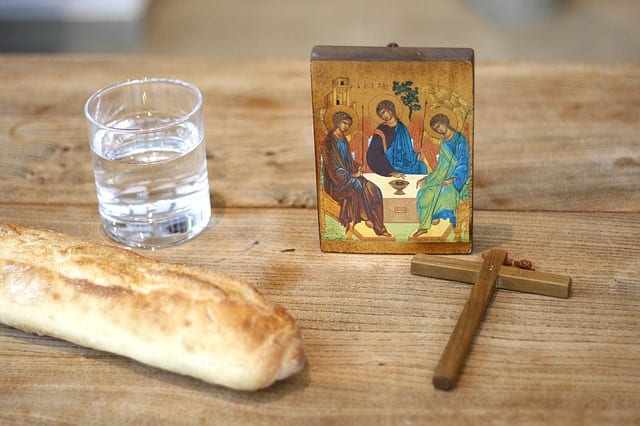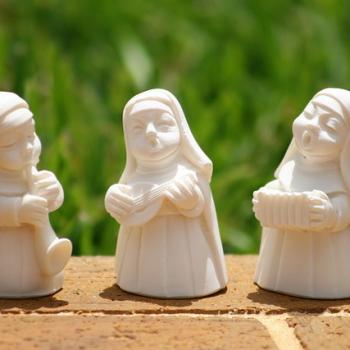
Here it is Ash Wednesday in the Latin Rite. Some of our Eastern brothers and sisters have already begun Lent on Monday and some are going to next Monday. I think it’s time to say a word on the subject of fasting.
I know from experience that fat people like me tend to take our lives in our hands if we talk about food on the internet, so let me get this out of the way first: yes, I am fat. I have a bad case of fibromyalgia which, along with literal hundreds of other possible symptoms, lowers the metabolism, leads to water retention and makes me exhausted all the time. Despite this I’ve managed to lose quite a bit of weight since my official Patheos mug shot was taken two years ago, but I’ll never be slim. None of this means I’m wrong about fasting, so save your jokes for another occasion.
Now: if you are Latin Catholic, you’re supposed to be fasting and abstaining today (Ash Wednesday) and on Good Friday, and abstaining on every Friday in Lent. A fast day is defined as one meal big enough to keep you going and also two smaller meals, the size of which combined does not exceed the big meal. When you eat them is up to you. Abstinence, as I’ve always understood it, is defined as no flesh from a warm-blooded animal, although some people in South America apparently eat Capybara because that’s a river creature. But definitely no beef, pork or fowl. Eggs, dairy and fish are okay. So is alligator or frog if they’re part of the normal diet where you come from. The idea, for fast and abstinence, is to keep it simple, so peanut butter toast is much more appropriate than lobster bisque and salmon en croute, although technically according to the letter of the law both “count.” If you’re Eastern Catholic, there are fast days on your calendar that forbid meat, eggs, AND dairy, and fasting on bread and water is considered “traditional.” Different churches and eparchies have different rules.
The fasting rules, at least in the Latin Rite, apply to people aged 18 to 59, and the abstinence rules are for anyone over 14, if they are not pregnant or sick.
That “or sick” one needs to be emphasized. No one is required to fast or abstain if they’re sick.
And guess what? Chronic illness, including mental illness, counts.
I know that it can be hard for chronically ill people to remember this. Sickness is so often our everyday state that we’re used to it; it can seem like cheating to consider ourselves too sick to fast. But we are sick. If you have any kind of metabolic condition and your blood sugar suffers whenever you try to observe a day of fasting and abstinence no matter how much juice you drink between meals, you don’t have to fast– and, in fact, you should not fast. You should have a healthy snack or meal whenever you need to. If you have a condition that causes fatigue and small frequent meals take the edge off of it, you absolutely should eat small frequent meals. If taking your medication with food helps keep you from throwing it up, take your medication with food. If you need to be on a high-protein diet and bread and water make you dizzy, have some fish– or meat, if fish isn’t cutting it. If you’re in bad pain today, the pain is the cross you have to bear and you shouldn’t make it harder on yourself by fasting. That’s not only “allowed,” it’s what you’re supposed to be doing. Don’t fast.
If your particular struggle is psychiatric? You’re still sick. If you have an eating disorder, then part of its treatment requires listening to your dietitian and eating food on a certain schedule. That is as necessary as medication and therapy, and giving it up to fast for a day could be a disaster. The purpose of fasting in the first place is to discipline our hearts in order to have the proper attitude toward eating. Through no shortcoming or sin of your own, you bear a very heavy cross, and part of that cross is to struggle with an especially painful and difficult relationship to eating. The form of self-discipline that is necessary for you isn’t the usual day-of-fast-and-abstinence kind. It’s listening to your medical professionals and eating as well as you can.
And that goes for other mental health struggles as well. If you have depression that makes you loathe yourself and want to punish your perceived faults by never eating a healthy or a tasty meal; if you have anxiety or ptsd that upsets your stomach so badly it’s hard to keep any food down; if you have a social phobia that has kept you confined to your home with no groceries for days now– you are sick. You are suffering from an illness that’s not your fault, and it’s not a good idea to fast. The fasting that God asks of you is to take as good care of yourself as you can. Eat something that makes you feel well. Get on facebook and ask your friends to remind you to eat if that helps you. Order takeout if you can’t get out the door. Say grace before your meal. It counts.
Do not beat yourself up. Despite what you might have heard, that’s not what Lent is about.
Lent is all about repenting in any way we’ve gone wrong and returning to the love of God. God is your Father who loves you, and He wants you to take care of yourself mentally, spiritually and physically. For most people, part of that care involves the discipline of observing days of fast and abstinence during Lent. But if you’re sick physically or mentally, what you ought to do looks different.
God does not want you to hurt yourself. Be at peace.
(image via Pixabay)

















